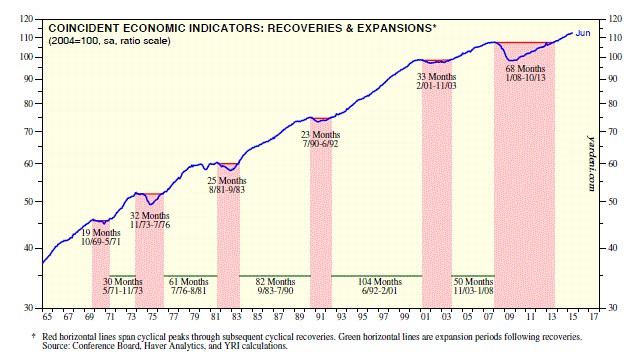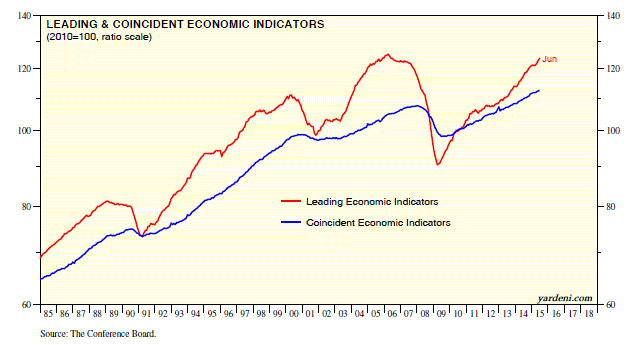
I have previously shown that based on the past five business cycles, the next recession might not start until March 2019. I examined the Index of Coincident Economic Indicators (CEI) for some historical guidance on the longevity of economic expansions. Let’s update our analysis.
It has taken 68 months--from January 2008 through October 2013--for the CEI to fully recover from its severe decline during 2008 and early 2009. The previous five recovery periods averaged 26 months within a range of 19-33 months. The good news is that the average increase in the CEI following each of those recovery periods through the next peak was 18.6%, over an average period of 65 months within a range of 30-104 months. If we apply this average to the current cycle, then the CEI would peak in 45 more months, during March 2019, with a substantial gain from here.
For now, let’s just enjoy the fact that the CEI is at a record high, and 4.7% above its previous cyclical high during January 2008. All four components of the CEI (payroll employment, real personal income less transfer payments, industrial production, and real manufacturing and trade sales) are at or near their recent record highs. The Index of Leading Economic Indicators rose 0.6% during June, very close to its record high in March 2006.
My extrapolation of the business cycle based on the recent and limited history of the CEI is meant simply as a benchmark for thinking about potential events that could cause a recession sooner, or later, than March 2019. In the past, economic expansions tended to crescendo into booms with rising inflation. The Fed would respond by raising interest rates. Tighter monetary conditions often caused a credit crunch, which then would cause a recession.
This time may not be different, but it has been different so far. Inflation has remained remarkably subdued, not just in the US but globally. Central banks have been flooding financial markets with liquidity in an attempt to boost inflation closer to their 2% targets. So far it hasn’t worked, and instead of a global boom we have global secular stagnation, with China slowing, the Eurozone barely recovering, and Japan stumbling. The CPI headline and core inflation rates among the major industrial G7 economies were only 0.2% y/y and 1.4% during May. The volume of world exports rose just 1.0% y/y during May, while the value of those exports is down over 10% through April.
I doubt that the business cycle is dead, though I suspect that inflation may be dead. As inflation remains subdued and central banks continue to provide ultra-easy monetary policies, the next recession may very well be a long way off. If inflation makes a sudden comeback, a possibility I can’t dismiss, then all bets are off. A meltdown in China’s financial markets and economy might also trigger a global recession, which is why I am concerned about the renewed weakness in commodity prices, as I discussed last week.
Today's Morning Briefing: The Great Diversification. (1) Deep in the heart of Texas. (2) Lone Star State has lots of stars. (3) Healthy industrial mix around the country. (4) A long time till the next recession? (5) What might cause the next bust? (6) After the Great Moderation and the Great Recession. (7) Business has learned self-control. (8) Similar to the 1990s with more diversification? (9) Can the US decouple from a global recession? (10) Another round of “shock and awe?” (11) Curbing exuberance.

